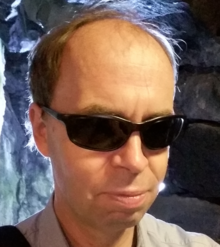Claudius Gros
Claudius Gros (born February 18, 1961 in Mainz ) is a German physicist.
Life
After graduating in 1985 from ETH Zurich with a thesis on heavy fermions , he did his doctorate in the field of theoretical solid-state physics with a thesis on high-temperature superconductors . With the help of projected wave functions , a class of Martin Gutzwiller's wave functions, d-wave superconductivity was found for high-temperature superconductors. His doctoral supervisor was T. Maurice Rice.
This was followed by a two-year stay at Indiana University where he worked with Steven M. Girvin and Allan H. MacDonald .
After a stay at the University of Dortmund Gros 1999 to a professorship for Theoretical Physics at the University of Saarland and acts as as since 2005 Professor of Theoretical Physics at the University of Frankfurt , where he in research since complex systems and complex adaptive systems studied . He has also written a textbook on this subject . At the end of 2016 he also published the fantasy novel Mageia, the book of colors .
Claudius Gros is married to the physicist Maria-Roser Valenti . The marriage had three children.
Genesis project
2016 Gros has conducted a study in which he the feasibility of an interstellar probe has examined the ecosphere from unicellular organisms to habitable would establish, but otherwise uninhabited exoplanets. Exoplanets, which are only temporarily habitable and therefore do not have enough time for the independent evolution of complex life forms , could, with the help of Genesis probes, skip the first three to four billion years, which were necessary on earth to produce a Precambrian ecosphere made of highly developed single cells .
According to Gros, the Genesis Mission would have no concrete benefit for humanity. The mission duration could therefore be long. The start could be carried out in the same way as the Starshot project with the help of laser-supported drive systems. Braking would also be passive, with the help of magnetic sails. A gene laboratory for the in-situ synthesis of unicellular organisms would be on board the probe .
Web links
- Homepage at the University of Frankfurt .
- Jessica Boddy Q&A: Should we seed life on alien worlds? , Science , September 9, 2016.
- Ross Andersen How to Jump-Start Life Elsewhere in Our Galaxy , The Atlantic, August 25, 2016.
- 3sat scobel Interview Can new life be brought to exoplanets? , October 19, 2017.
Individual evidence
- ↑ Claudius Gros: Complex and Adaptive Dynamical Systems, A Primer , Springer (2008, second, third and fourth edition 2010/2013/2015).
- ^ Claudius Gros: Mageia, the book of colors , tredition (2016).
- ↑ Claudius Gros: Developing Ecospheres on Transiently Habitable Planets: The Genesis Project , Vol. 361, pp 1-14 (2016).
- ↑ James Romero, "Should we seed life through the cosmos using laser-driven ships?" , New Scientist , Nov. 13 (2017).
- ↑ Wissenschau.de: The synthetic cell - first artificial form of life?
| personal data | |
|---|---|
| SURNAME | Gros, Claudius |
| BRIEF DESCRIPTION | German physicist |
| DATE OF BIRTH | February 18, 1961 |
| PLACE OF BIRTH | Mainz |
